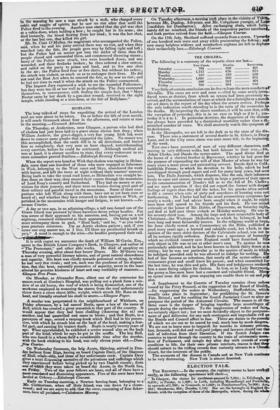THE CHOLERA.
The following is a summary of the reports since our last—
New Cases. Deaths. Recoveries:
Saturday 703 239 431
Monday 1,747 676 978
Tuesday! • 518 219 330
1,051 333 611 Thursday 880 357 468
Friday '728 204 816 Very little of certain conclusion can be drawn from the mere numbers #r this table. The cases are ever and anon swelled by some newly-intni- duced town or district, from which no return had been previously 14- ceived, and the accumulations of cases at which fora fortnight or a month. are set down in the report of the day when the return arrives. Perhaps the only indication worth attending to is the ratio of the recoveries tOt the deaths. By inspecting the above numbers, it will be seen that, wide the exception of yesterday, this is in no case so high as 2 to I; yea- terday it is 4 to 1. In particular districts, the departure of the disease has always been preceded by a diminished mortality rather than a di- minished number of eases. We shall anxiously watch this symptom r}f its declension.
In the Metropolis, we are left in the dark as to the state of the 81 ease. There was a statement of several deaths in St. Giles's, in Drury Lane, and in the City some alarm was once more felt, in the beginnink of the week.
Two cases have occurred, of men of very different characters, ate moving in very different walks, but both famous in their way,—De.. Adam Clarke, and Dando the oyster-eater. The aged divine died at the house of a clerical brother at Bayswater, whither he had gone for the purpose of expounding the will of that Master of whom he was for many years a most pious and painstaking servant. Dando died in Cold- bathfields Prison; to which his devotion to his belly, which he had worshipped through good report and evil for many long years, had sent him. The Daily Journals, which dispense, like the sun, their influerice freely to saint and sinner, devote nearly as large a portion of their space. to the commemoration of Dando's fall as to the fall of Dr. Claake; and we much question if they did not regard the former with deeper feelings of regret than they did the latter, for his pranks often served to fill a corner when acts of piety and anecdotes of learning were not forthcoming. Dr. Clarke had had the usual premonitory symptoms far nearly a week ; and had advice been sought when it ought, he might have been still spared to his friends and his flock. He was seized, serionsly.at the house of Mr. Hobbs, of Bayswater, on Saturday night. and died at half-past three o'clock on Monday morning. He was is his seventy-third year. Among the large and most respectable body cr Christians—the Wesleyan Methodists, to which he belonged, he had been long and most favourably known. In the religious world at large, his fame chiefly rested on a Commentary on the Bible, published a good many years ago ; a learned and valuable work, but which, in tile - opinion of the more strict doctors of the Calvinistic school, was not all its notions rigidly orthodox. Dando was a specimen of hums which no civilized country save England could have furnished. only object in life was to eat at other men's cost. To oysters he was particularly addicted, and he has been known to finish thirty dozen atar. sitting; but he was not particular as to the species of meals in idler he indulged, provided only he was allowed to indulge for nothing. Tha bad of late become so notorious, that nearly all the oyster-sellers an$. restaurants great and small knew his person; and when committed for the last time, he was thin and pale. His fasts and indulgences rendered. him a most fitting subject for cholera. In him, as in Lady Banymory, the penny-a-line-men have lost a constant and valuable friend. Many- an oyster treat did this great unpaying one enable them to eat and also.
A Supplement to the Gazette of Tuesday contains three orderer issued by the Privy Council, at the suggestion of the Board of Heal*, —for suppressing the wakes at Wednesbury, Staffordshire, whicja usually take place in September; for prohibiting the St. Jamests Fair, Bristol; and for enabling the Scotch Justiciary Court to alter cfr postpone the period of the Autumnal Circuits. The reason in all the three eases is the danger of bringing together large assemblages Or - people during the epidemic. To the suppression of wakes and fairf, we certainly object not; but we most decidedly object to the postpone.- meat of pol deliveries for any such contingent and improbable evil aw the Boards and Council affect to fear. There are duties in the purs.-. of which we are not to be scared by real, much less by mock dangers.. We are not to leave men to languish for months in noisome prisons,
lest, forsooth, wellafed and well-paid judges and lawyers should run the risk of infection from their liberation. If the Scotch Judges can contrive to travel through the country in the train of aristocratic meria- bers of Parliament, and mingle day after day with crowds of every condition in life, for their awn private interests, reason is that they should submit to the trifling crowds that curiosity attracts to a Circuit Court, for the interests of the public.
The accounts of the disease in Canada and at New York coat:jigger to be very distressing. New York is almost deserted.


























 Previous page
Previous page